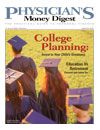Publication
Article
Physician's Money Digest
Sustain Your Fiscal Health with an Advisor
Author(s):
Although vacations and national holidays typicallyprovide a welcome break for every diligentphysician, there is one big break aheadthat should be a priority on everyone's calendar—retirement. While it may be closer for some than it isfor others, every physician needs to assess their currentfinancial situation and prepare for when thetime comes to take a permanent leave from the ranksof the employed.
Risk and Diversify Early
If you have at least 10 years until retirement, youstill have the advantage of time on your side. One ofthe most basic principles of investing is allocatingyour money into different investment vehicles andthen leaving it there so you can reap the benefits oflong-term returns. Moreover, you might be able toafford a little bit more risk with your investments.Although equities, such as stocks, have an inherentrisk of losing money, they also historically providesignificant returns over a long period of time. Justkeep in mind that past performance is no guaranteeof future results.
Probably the biggest advantage of getting an earlystart is the benefit of compounding earnings. Basedon the investments in your retirement portfolio, themoney you contribute has the potential to earn moremoney for you—whether through interest payments,dividends, or other means of growth. In many cases,these earnings can be reinvested into your portfolio,further enhancing the total value of your savings andallowing your money to make money for you.
Adjust and Stabilize
If your retirement is less than 10 years away, nowis the time to start making subtle adjustments to yourinvestment mix. Take a look at how you allocateyour investments and ensure they appropriatelymatch your risk tolerance, investment objectives, andtimeline. Because you are close to retirement, you stillwant to have some investments that offer growth,but you also want to begin looking at alternativeslike bonds that will provide stability in your portfolioand help reduce your overall risk.
At some point you'll reach the day that you oncethought was so far off. When you find yourselfready to retire, your behavior on your funds willhave changed. Instead of making contributions toyour retirement funds to help them grow, you'lllook to maintain income from those investmentsand most likely take distributions from them to payfor your daily living expenses. A thorough reviewof your investments will help you plan your distributionsso you don't run short of funds duringyour big break.
Joseph F. Lagowski is vice president, investments, and a financial
consultant with AG Edwards in Hillsborough, NJ. He welcomes
questions or comments at 800-288-0901 or www.agedwards.com/fc/joseph.lagowski. This article was provided by AG Edwards
& Sons, Inc, member SIPC.
